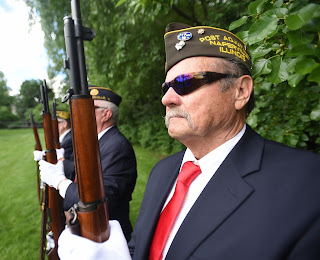None of that matters today.
We’re standing here in the hot Florida sun to render one last service to one of our own. We’re here to render last military honors to a World War II vet who passed away and is being interred today.
The “we” in mention is the Honor Guard of the Veterans of Foreign Wars Post #10209, of Spring Hill, Fla.
Yes, I’ve become one of those guys … who wear military style hats and crisp white shirts. I’ve become of those guys who show up to march in small town parades behind the fire engines; those guys who sit outside WalMart stores to sell paper poppies on Armistice Day, and who show up at military funerals to fire ragged rifle salutes with ancient M-1 Garand rifles.
It’s necessary, you see. If “we” don’t do it, who will? There aren’t many of us left.
* * *
Veterans organizations like the VFW, the American Legion and the DAV, exist today because we have – as our British cousins would say – “seen the elephant” and most of you have not.
We have been forged and changed in the crucible of military service, and it sets us apart from the other 99% of the American population who have not served.
You may not even notice it, except that we act “different.” But we notice it. A lot.
Serving in the military, especially in wartime, changes people in ways that their civilian friends and family cannot begin to fathom. Once you’ve served in the military, you’ll notice that you are no longer defined by the same limits as many of your civilian friends. Where once you might be tempted to just throw up your hands and walk away from a task too difficult or too dangerous, military people are taught and trained to dig deeper, hang on, and to find resources inside they never knew they had.
“Do or die” now defines us, instead of “Close enough for government work.”
The US Marines like to say that “The Change is Forever” … and it is.
When the first Veterans came home from the American Civil War, they founded in 1866 the first ever US veterans organization, the Grand Army of the Republic. It was because veterans needed someone to talk to. Anecdotal tales from the time noted that veterans found they couldn’t (or wouldn’t) discuss the war with their families. Indeed, they found they couldn’t really discuss their experiences with anyone who hadn’t been there. ..with anyone who hadn’t also “seen the elephant.”
No disrespect intended towards loving family members and caring civilians, you understand. It’s just that you wouldn’t understand. You lack the cultural and experiential reference points to fully comprehend the changes in us. Even among ourselves, we find it difficult to put into words what we’ve seen, what we’ve done. But there’s the key.
Among ourselves, we don’t NEED to put it into words.
Looking around a crowded VFW post during a meeting, you can hear the same coarse jokes and vulgar language we learned in Boot Camp or Basic Training. Look a little closer and you can see the same thousand-yard-stare in everyone’s eyes.
Among ourselves, we can let our (white) hair down and relax a little.
There’s something else at work behind veterans organizations. Something shameful.
This country has a long history of backing away from its promises to veterans. Nowadays, it’s not at all uncommon to hear Congressmen or Congressional budget analysts talk about the expense of Veterans health care (which was promised to us), while their own health care system is superior to everyone else’s. Some even talk openly about trying to balance the federal budget by cutting funds for the Veterans Administration.
We get it. We really do. We’re an expensive commodity … but in a country where 99% of the population chooses not to serve, we’re worth every penny.
* * *
Which leads us back here to the cemetery and the VFW Honor Guard waiting in formation.
Even in a veterans’ organization like the VFW, not every member wants to experience this.
Honor Guard members know that, the moment the commands are given and they fire the rifle salute, taps is going to play from the electronic bugle carried by another of our members. That’s when the family nearby will know they’re saying goodbye to their beloved grandfather for the last time. That’s when the wracking sobs will start, and the heavy feeling of grief will truly set in.
We know that our rituals and ceremony are part of their leave-taking and closure.
We share in those moments with the families. Every time. But we don’t do it for them.
We do this so our departed brother or sister will know their comrades were here for them.
After a lifetime of service in uniform, we do this difficult task as one last service to one of our own.




No comments:
Post a Comment